 By Staff
By Staff
October 19th, 2023
BURLINGTON, ON
Halton Region Public Health has confirmed that a bat found at LaSalle Park in Burlington on October 9, 2023 has tested positive for rabies. Any Halton resident or their pet who may have had direct contact with this bat or another suspicious wild animal around this location and date should seek medical or veterinarian attention immediately.

Rabies in bats is uncommon, bites from rabid bats have caused almost all human cases of rabies in Canada.
Rabies is a viral disease that causes severe damage to the brain and spinal cord and, if untreated before symptoms appear, can lead to death. The virus is spread through the saliva of an infected animal such as a raccoon, skunk, bat, dog, cat, fox, or other wild animal, usually through a bite or scratch. Rabies illness in humans is exceedingly rare, and can be prevented by the use of a rabies vaccine following exposure, which is extremely effective, but only if it is administered before symptoms occur.
Although rabies in bats is uncommon, bites from rabid bats have caused almost all human cases of rabies in Canada. Bats have small, needle-like teeth, and their bites easily go undetected. If you have been bitten, scratched or exposed to bat saliva, wash any wounds thoroughly with soap and water and seek medical attention immediately.
It is not always possible to identify if a bat has rabies, as rabid bats may move slowly, lose the ability to fly, remain active during daylight hours or be unresponsive to loud noises. If you find a bat in your home, do not attempt to move it and contact your local Animal Control Services. To report a wild animal that you suspect may have rabies, follow the steps on ontario.ca/rabies.
There are a number of ways you can protect your family and pets from rabies:
- Know what to do when exposed to a bat or any other animal:
- Call Animal Control Services. Do not touch dead or sick animals with bare hands.
- Collect the contact information of the animal’s owner/custodian where applicable (their name, address and phone number).
- Immediately wash all bite or scratch wounds with soap and water and seek medical attention.
- Report all animal bites or scratches to Halton Region Public Health by calling 311.
- Other prevention and safety measures include:
- Educate children to stay away from any wild, stray or aggressive animals.
- Do not touch, feed or move wildlife, including young, sick or injured animals.
- Avoid animals that are behaving strangely.
- If you find a stray animal, report it to your local Animal Control Services.
- Do not keep wild animals as pets.
- Make sure your pet’s rabies vaccinations are up to date.
- Keep your pet on a leash when off your property.
- Have your pet seen by a veterinarian if it has come in contact with a bat or other wild animal.
- Animal-proof your home by filling any holes that could allow animals to enter.
For more information on rabies, visit halton.ca or contact Halton Region Public Health by calling 311.














